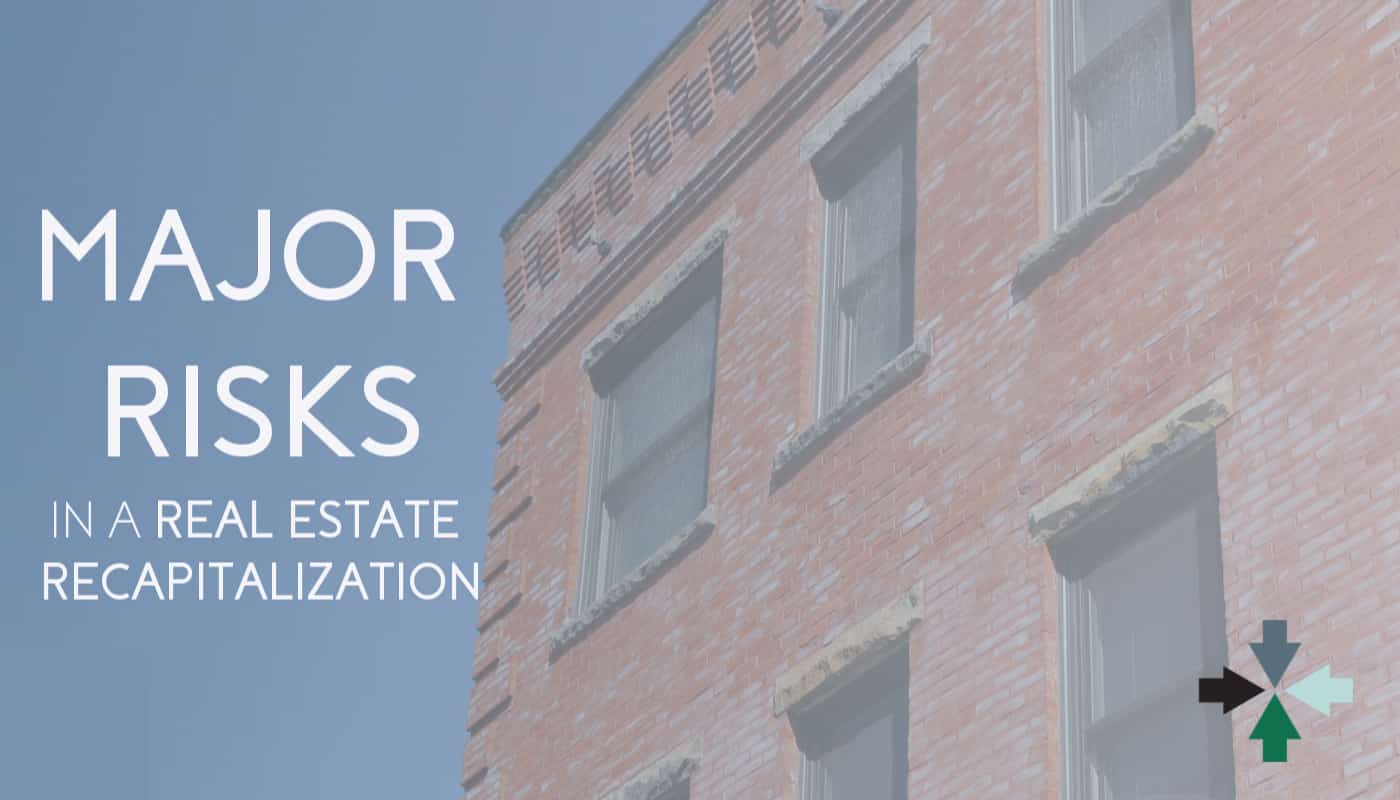FREE TRAINING
What is Real Estate Crowdfunding?
Learn how to build wealth and earn passive income in real estate while someone else does all the work.
3 Risks to Watch for in a Real Estate Recap
By Adam Gower Ph.D.

A recapitalization of a project occurs when a sponsor refinances a project they already own, oftentimes bringing in new investors to provide additional equity.
An obvious advantage to this scenario is the mitigation of risk that comes from the sponsor’s legacy knowledge of the building and its operating performance.
However, there are three major risks that investors in such types of recapitalizations should be aware of, tax consequences, lender issues, and liability.
Tax Consequences
The first concern investors should review are tax consequences stemming from the concept of the partnership ‘basis.’
It works like this.
If you buy a property for $100, at acquisition your basis in the property is going to be a $100.
If you have a recap where you have a stepped-up basis by valuing it at a $200, your new basis is going to be $200.
This can trigger capital gains obligations for the sponsor and prior partners and new partners cannot take advantage of certain tax benefits that would otherwise accrue to the original owners.
To mitigate these issues, a partnership will want to consider a 754 election with the IRS.
A 754 election says that your basis in the partnership, if you're doing a stepped-up recapitalization, is going to match the inside basis to the outside basis which, in non-accounting-speak, means the new partner’s interests will be set to ensure they benefit from any depreciation and appreciation in the property’s value in a timely fashion, and not have to wait until the asset is sold.
As this is a decision that must be taken at the partnership level, investors should ask the deal sponsor if they intend to take make 754 election, and that they outline any consequences unique to the transaction.
Get access to our FREE weekly newsletter exclusively covering the latest updates from the real estate crowdfunding world
Lender Issues
The second major issue with recaps is that lenders don’t like recaps.
Lenders want to know at closing who it has made a loan to, and who the principals of the borrower are.
Most sets of loan docs will have a prohibition on transfers, which can include certain types of recapitalization, without lender consent.
There are a few reasons for this.
Some pertain to compliance regulations; KYC (Know Your Customer – anti-corruption), AML (Anti-Money Laundering), and OFAC (Office of Foreign Assets Control – counter terrorism).
Banks need to make sure that their loans aren't going to be triggering any breaches of these laws.
However, even though restrictions against recaps are commonplace in loan docs, they aren't heavily enforced unless there are other reasons to trigger a default, typically failure to pay as agreed.
This is important for investors because if a sponsor has recapitalized without lender consent, there could be cause to trigger a breach of the loan docs.
During the downturn of 2008-2009, predatory investors would acquire pools of notes looking for these kinds of defaults and foreclose even if the borrower was paying as promised.
Investors don't want to make an investment in a deal if that investment is going to be in a technical default under the loan docs.
However, investors are not likely going to have the opportunity to go through loan docs to make sure that everything's kosher.
The best way to mitigate this risk is to ensure that the sponsor is representing in the partnership agreement that investors are not, by coming into the partnership, triggering a default of any of loan provisions.
Existing Liabilities
The third big issue to look for is liability.
Investors need to be certain that there aren't any pre-existing liabilities that wouldn't otherwise exist in a straight acquisition.
This is to ensure that the investors coming in during the recap are not going to be on the hook for any losses not incurred after they entered the project.
The best way to get this kind of assurance is through negotiating full indemnification from the sponsor for any acts, or anything that occurred prior to an investor coming in during the recap.
If you can’t negotiate this, or if you are willing to take the sponsor's terms at face value, as you might on a real estate crowdfunding platform, then one way to ameliorate the risk is to see that the sponsor has adequate insurance for preventing against loss, particularly those that may occur as a result of actions that occurred prior to investors coming into the deal through the recap.
For example, the kind of situation that this might apply to could look like this: If the recap is on a partnership and the only asset of the partnership is a specific property, any recourse against the partnership could adversely affect the value of the property.
Let's say there's a $2 million judgment post recap, for something that occurred four years earlier.
That could wipe out all the equity in the partnership.
That’s what investors want to be watching for because such a judgment could wipe out all the equity in the project, including all that newly gained through the recap.
The only way to insulate investors from this is to ask for indemnification against such losses, one tier up from the partnership i.e. directly from the sponsor because indemnification from the partnership would likely be worthless if all the partnership owned was a specific property.
Recaps have their place.
They provide continuity and can reduce risk of the unknown through legacy sponsor experience operating and managing the asset.
However, before investing in a recapitalization of an existing asset, it is important that investors are aware of the risks that are particular to recaps and the kind of finance that they provide.
For more information on this subject and other advanced insights into contractual issues in real estate investing, please attend the next webcast ‘Real Estate Investment Contracts – Reading Between the Lines’ by clicking here.
POSTED BY

ADAM GOWER PH.D.
Adam Gower is a 30+ year veteran real estate investment and finance professional. He expands investor networks for real estate developers by implementing best-of-class digital marketing programs. Dr. Gower has written several books, the latest, Leaders of the Crowd, chronicles the legislative origins of crowdfunding and how real estate came to dominate the industry.
This article is dedicated to my friend, Ed Mansell whose intellect was matched only by his humility and humanity. He will be missed by all.
Newbie
If you want to build your wealth and earn passive income from real estate investing and are looking at deals on marketplace platforms or through developers online, then I recommend you start by the 8 Key Financial terms so you can understand every deal you look at.
The 8 Financial Keys are not only a great way to get started, they are also essential to understanding how you’ll make money in any real estate deal.
You’ll learn the most important financial concepts you need to know in real estate investing that apply to every type of real estate no matter the asset class (office, industrial, residential, hospitality, retail).
Intermediate Investor
If you’ve got some online real estate investments under your belt already and are beginning to receive passive income checks each month, or have been paid off with profit – or (hopefully not) are finding that some deals are not quite panning out the way you expected, then check out this page for a wealth of free resources.
Here I cover everything from beginner all the way to very advanced real estate concepts.
You’ll find podcasts with developers, researchers, professors and other industry experts, detailed articles, and lots of videos, both short and long that are all easily searchable and totally free.
Advanced Investors
I am not shy about being straightforward about real estate investing; it is exciting, lucrative, and can help you build wealth and income as part of your investment portfolio, but it is not without its risks.
As an advanced investor you know this already, so I’ve put together a webinar for you that guides you through one of the most important components of real estate investing: Real Estate Contracts – reading between the lines.
This is advanced learning and based off conversations I had with three of the top real estate attorneys in the country, combined with my own personal experience. Access it here; it could be the most important webcast you watch all year.


